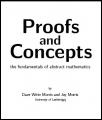
An Inquiry-Based Introduction to Proofs
by Jim Hefferon
Publisher: Saint Michael's College 2013
Number of pages: 23
Description:
Introduction to Proofs is a Free undergraduate text. It is inquiry-based, sometimes called the Moore method or the discovery method. The text consists of a sequence of exercises, statements for students to prove, along with a few definitions and remarks. The instructor does not lecture but instead lightly guides as the class works through the material together.
Download or read it online for free here:
Download link
(200KB, PDF)
Similar books
 Proofs and Concepts: the fundamentals of abstract mathematics
Proofs and Concepts: the fundamentals of abstract mathematicsby Dave Witte Morris, Joy Morris - University of Lethbridge
This undergraduate textbook provides an introduction to proofs, logic, sets, functions, and other fundamental topics of abstract mathematics. It is designed to be the textbook for a bridge course that introduces undergraduates to abstract mathematics.
(16513 views)
 An Introduction to Higher Mathematics
An Introduction to Higher Mathematicsby Patrick Keef, David Guichard, Russ Gordon - Whitman College
Contents: Logic (Logical Operations, De Morgan's Laws, Logic and Sets); Proofs (Direct Proofs, Existence proofs, Mathematical Induction); Number Theory (The Euclidean Algorithm); Functions (Injections and Surjections, Cardinality and Countability).
(16116 views)
 Book of Proof
Book of Proofby Richard Hammack - Virginia Commonwealth University
This textbook is an introduction to the standard methods of proving mathematical theorems. It is written for an audience of mathematics majors at Virginia Commonwealth University, and is intended to prepare the students for more advanced courses.
(39677 views)
 Proof in Mathematics: An Introduction
Proof in Mathematics: An Introductionby James Franklin, Albert Daoud - Kew Books
This is a small (98 page) textbook designed to teach mathematics and computer science students the basics of how to read and construct proofs. The book takes a straightforward, no nonsense approach to explaining the core technique of mathematics.
(13579 views)